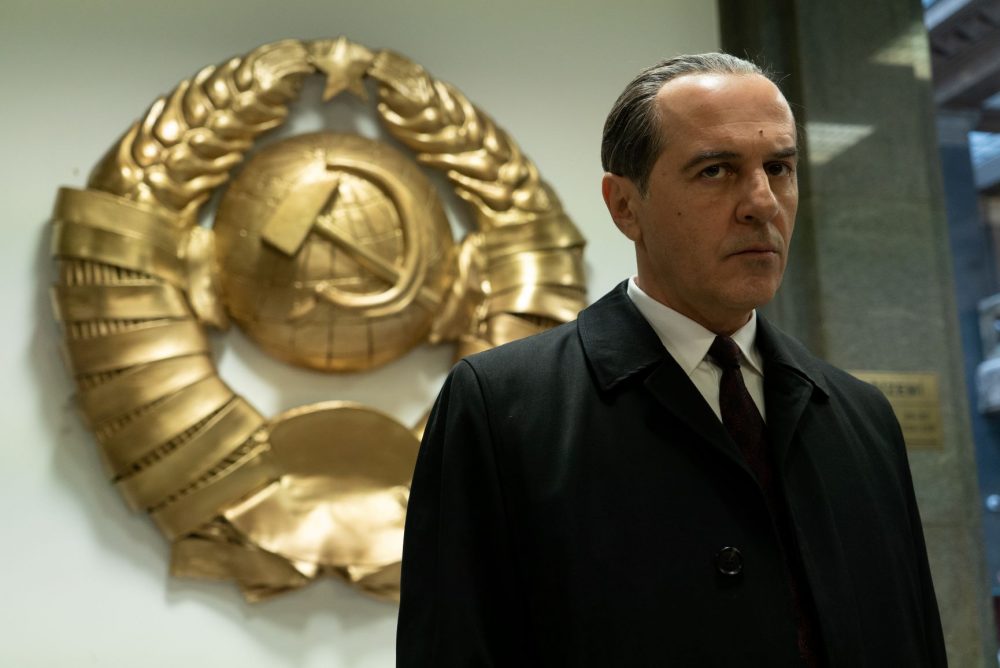On the screen: Cold warriors
Posted By Stephen Loosley on April 30, 2021 @ 12:30

The Courier, directed by Dominic Cooke, is a film of the Cold War with the Cuban missile crisis of 1962 as backdrop. The central characters, British salesman Greville Wynne (Benedict Cumberbatch) and GRU (Soviet military intelligence) Colonel Oleg Penkovsky (Merab Ninidze), are centre stage, but the real dynamic is the challenge issued by the Soviet Union and its empire to the United States and its Western allies. Infamously, Soviet leader Nikita Khrushchev had boasted that the USSR would bury the West and this claim features in the opening of the movie. A nuclear war between the two superpowers of the time emerges as possible as the Soviet presence in Cuba is revealed to be more threatening than originally thought.
Khrushchev destabilised the West with his recurring assertions of Soviet military strength. Nuclear missiles, he maintained, were being churned out like sausages at Soviet factories. This was not true. American, indeed Western, military strength at the time of John F. Kennedy’s presidency was actually overwhelming. Nonetheless, Khrushchev was a figure to be feared and not only by Western audiences.
A highly decorated war hero, Penkovsky is badly shaken by Khrushchev’s threats. He knows that the USSR would be wiped out in a nuclear exchange with the West and he decides that, notwithstanding the treacherous nature of his actions, he will do his best to prevent that happening.
Penkovsky’s cover role in the Soviet trade ministry in Moscow causes him to meet a minor British businessman who becomes his courier between London and Moscow for Soviet nuclear secrets.
Georgian actor Ninidze is superb as Penkovsky, whose fearful unease about what he is doing appears in his gestures and upon his face, as well as in the dialogue. Penkovsky is careful to keep his family totally unaware of his betrayal. So too does Wynne, a reluctant allied spy who was recruited by Anglo-American intelligence agencies MI6 and the CIA to tap into the goldmine of Penkovsky’s secret knowledge.
Cumberbatch is invariably convincing in whatever role he is asked to master. In Wynne, he projects a dull suburbanism that is of scant interest to anyone beyond his immediate interlocutors. His handlers believe that this will cause the KGB to be dismissive of Wynne as anything other than a minor British salesman. Wynne’s wife Sheila (Jessie Buckley), however, sees the changes in him as he travels to and from Moscow. She suspects an affair.
The Cold War has faded in memory as the global balance has shifted from the Atlantic to the Indo-Pacific. As we confront a second cold war, there are some telling lessons in The Courier.
The most powerful performance in the movie is real. It is Kennedy’s televised declaration to the world that the Soviet presence in Cuba is unacceptable and that any missile fired from the island to a target in the Western hemisphere will be met by a comprehensive American response, meaning a nuclear one, directed at the Soviet Union. This was thinly veiled code for Armageddon. Soviet over-reach brings serious consequences.
Cooke as director has previously registered with On Chesil Beach and he does well in conveying the tensions between the Soviets and the West, even in effectively contrasting the drab greyness of Moscow with the dazzling lights of London’s Piccadilly Circus. But the movie maintains that the US and the UK work seamlessly together in running Wynne as an agent. CIA officer Emily Donovan (Rachel Brosnahan) is unfailingly optimistic and opportunistic in pushing Wynne. Her British counterpart, Dickie Franks (Angus Wright), is inevitably aloof and austere.
The performances of both actors are convincing but, at the time, suspicions between the US and UK intelligence services, occasioned by the defections of Donald Maclean and Guy Burgess to Moscow, and then Kim Philby, caused the CIA to doubt British reliability. Just remember CIA counterintelligence chief James Jesus Angleton’s witch hunts. This context is hinted at in the movie by the presence of an unidentified British traitor, but the suspicions in the Atlantic relationship were very great at the time and this reality could have made for a subtler canvas as background.
Ultimately, this movie is a tale of friendship, between two very different people who trust each other with their lives. Ideology is absent. Families are both so much more important as Wynne and Penkovsky become acquainted with each other’s partners and children, making the relationship between the two men ultimately critical in the outcome of the film.
Penkovsky is worth remembering, for his courage. So too is Wynne, who may have been a reluctant starter but finished with great credit as far more than a mere courier.
Article printed from The Strategist: https://www.aspistrategist.org.au
URL to article: https://www.aspistrategist.org.au/on-the-screen-cold-warriors/
Click here to print.